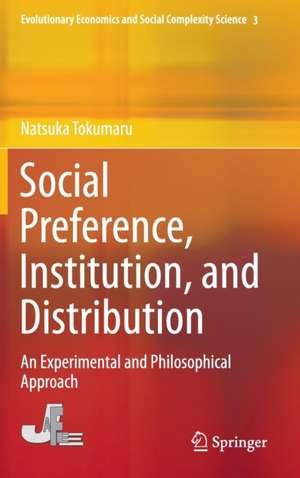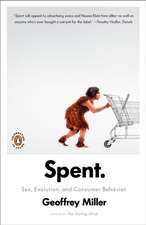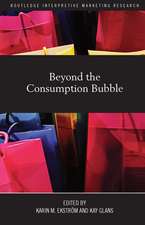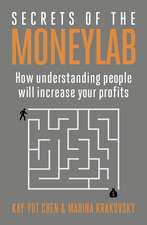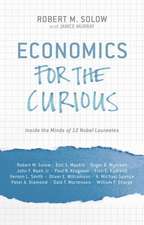Social Preference, Institution, and Distribution: An Experimental and Philosophical Approach: Evolutionary Economics and Social Complexity Science, cartea 3
Autor Natsuka Tokumaruen Limba Engleză Hardback – 2 mar 2016
This is the first book to examine behavioral theories on social preference from institutional and philosophical perspectives using economic experiments. The experimental method in economics has challenged central behavioral assumptions based on rationality and selfishness, proposing empirical evidence that not only profit seeking but also social preferences matter in individuals’ decision making. By performing distribution experiments in institutional contexts, the author extends assumptions about human behavior to understand actual social economy. The book also aims to enrich behavioral theories of economics directed toward institutional evolution.
The author scrutinizes how specific institutional conditions enhance or mute individuals’ selfish incentives or their fairness ideals such as egalitarian, performance-based, labor-value radicalism or libertarianism. From experimental results and their analysis, implications for actual problems in social economy and institutional change are derived: why performance-based pay often fails to promote workers’ productivity; why labor wages decline whereas shareholder’s values increase after financialization; and whether socially responsible investment can be a social institution for corporate governance.
The book is also addressed to philosophers of social sciences interested in how experimental methods can contribute to developing cognition of human behaviors and be extended to social theories. Referring to behavioral theorists in the history of economic thought, the author discusses the meanings of experiments in the methodology of social sciences. She also proposes new ways of interpreting experimental results by reviving historic social theories and applying them to actual social problems.| Toate formatele și edițiile | Preț | Express |
|---|---|---|
| Paperback (1) | 381.43 lei 6-8 săpt. | |
| Springer Nature Singapore – 7 apr 2018 | 381.43 lei 6-8 săpt. | |
| Hardback (1) | 388.72 lei 6-8 săpt. | |
| Springer Nature Singapore – 2 mar 2016 | 388.72 lei 6-8 săpt. |
Din seria Evolutionary Economics and Social Complexity Science
- 18%
 Preț: 792.34 lei
Preț: 792.34 lei - 15%
 Preț: 643.84 lei
Preț: 643.84 lei - 18%
 Preț: 723.21 lei
Preț: 723.21 lei - 18%
 Preț: 742.61 lei
Preț: 742.61 lei - 24%
 Preț: 634.34 lei
Preț: 634.34 lei - 15%
 Preț: 639.08 lei
Preț: 639.08 lei - 18%
 Preț: 730.16 lei
Preț: 730.16 lei - 15%
 Preț: 706.48 lei
Preț: 706.48 lei - 15%
 Preț: 583.61 lei
Preț: 583.61 lei - 18%
 Preț: 784.30 lei
Preț: 784.30 lei - 18%
 Preț: 721.01 lei
Preț: 721.01 lei - 15%
 Preț: 527.15 lei
Preț: 527.15 lei - 15%
 Preț: 644.63 lei
Preț: 644.63 lei - 15%
 Preț: 523.22 lei
Preț: 523.22 lei - 15%
 Preț: 638.24 lei
Preț: 638.24 lei - 18%
 Preț: 728.60 lei
Preț: 728.60 lei -
 Preț: 388.90 lei
Preț: 388.90 lei - 18%
 Preț: 737.26 lei
Preț: 737.26 lei - 15%
 Preț: 696.35 lei
Preț: 696.35 lei - 15%
 Preț: 690.11 lei
Preț: 690.11 lei - 15%
 Preț: 692.24 lei
Preț: 692.24 lei - 18%
 Preț: 1006.24 lei
Preț: 1006.24 lei - 24%
 Preț: 570.15 lei
Preț: 570.15 lei - 18%
 Preț: 789.52 lei
Preț: 789.52 lei - 18%
 Preț: 1004.81 lei
Preț: 1004.81 lei - 15%
 Preț: 642.68 lei
Preț: 642.68 lei - 18%
 Preț: 730.65 lei
Preț: 730.65 lei - 18%
 Preț: 729.53 lei
Preț: 729.53 lei - 15%
 Preț: 695.85 lei
Preț: 695.85 lei - 18%
 Preț: 732.52 lei
Preț: 732.52 lei
Preț: 388.72 lei
Nou
Puncte Express: 583
Preț estimativ în valută:
74.38€ • 77.66$ • 61.56£
74.38€ • 77.66$ • 61.56£
Carte tipărită la comandă
Livrare economică 05-19 aprilie
Preluare comenzi: 021 569.72.76
Specificații
ISBN-13: 9789811001369
ISBN-10: 9811001367
Pagini: 165
Ilustrații: XII, 165 p. 24 illus., 2 illus. in color.
Dimensiuni: 155 x 235 x 11 mm
Greutate: 0.43 kg
Ediția:1st ed. 2016
Editura: Springer Nature Singapore
Colecția Springer
Seria Evolutionary Economics and Social Complexity Science
Locul publicării:Singapore, Singapore
ISBN-10: 9811001367
Pagini: 165
Ilustrații: XII, 165 p. 24 illus., 2 illus. in color.
Dimensiuni: 155 x 235 x 11 mm
Greutate: 0.43 kg
Ediția:1st ed. 2016
Editura: Springer Nature Singapore
Colecția Springer
Seria Evolutionary Economics and Social Complexity Science
Locul publicării:Singapore, Singapore
Public țintă
ResearchCuprins
Preface.- I. Introduction: What Experiments Can Do in the History of Economic Thought? : From Adam Smith to Vernon Smith.- II. Fairness Ideals, Hidden Selfishness and Opportunistic Behavior: Experimental Approach.- III. What is ‘Fair’ Distribution under Collaboration? : Evidences from Lab-Experiments.- IV. Income Sharing between Workers and Investors: Experiments on Functional Income Distribution.- V. Socially Responsible Investment: Distribution among Investors, Enterprises, and Society.- VI. From Micro-Analysis to Social Theory: Wieser's Gedankenexperiment and Social Economics.- VII. Conclusion: From Empirical Behavioral Theory to Evolutionary Theory of Institution.- Appendix.
Notă biografică
Natsuka Tokumaru, Lecturer (Dr.), Graduate School of Economics, Kyoto University, Yoshida-Honmachi, Sakyo-ku, Kyoto, 606-8501, Japan
tokumaru@econ.kyoto-u.ac.jp
Textul de pe ultima copertă
This is the first book to examine behavioral theories on social preference from institutional and philosophical perspectives using economic experiments. The experimental method in economics has challenged central behavioral assumptions based on rationality and selfishness, proposing empirical evidence that not only profit seeking but also social preferences matter in individuals’ decision making. By performing distribution experiments in institutional contexts, the author extends assumptions about human behavior to understand actual social economy. The book also aims to enrich behavioral theories of economics directed toward institutional evolution.
The author scrutinizes how specific institutional conditions enhance or mute individuals’ selfish incentives or their fairness ideals such as egalitarian, performance-based, labor-value radicalism or libertarianism. From experimental results and their analysis, implications for actual problems in social economy and institutional change are derived: why performance-based pay often fails to promote workers’ productivity; why labor wages decline whereas shareholder’s values increase after financialization; and whether socially responsible investment can be a social institution for corporate governance.The book is also addressed to philosophers of social sciences interested in how experimental methods can contribute to developing cognition of human behaviors and be extended to social theories. Referring to behavioral theorists in the history of economic thought, the author discusses the meanings of experiments in the methodology of social sciences. She also proposes new ways of interpreting experimental results by reviving historic social theories and applying them to actual social problems.Caracteristici
Provides micro foundations for institutional and evolutionary economics by performing distribution experiments in institutional settings Demonstrates a new way of interpreting experimental results and applying them to understanding actual social economy Inquiries into problems of the philosophy of social sciences about how experimental methods contribute to cognition of human behavior and are extended to social theories Includes supplementary material: sn.pub/extras
